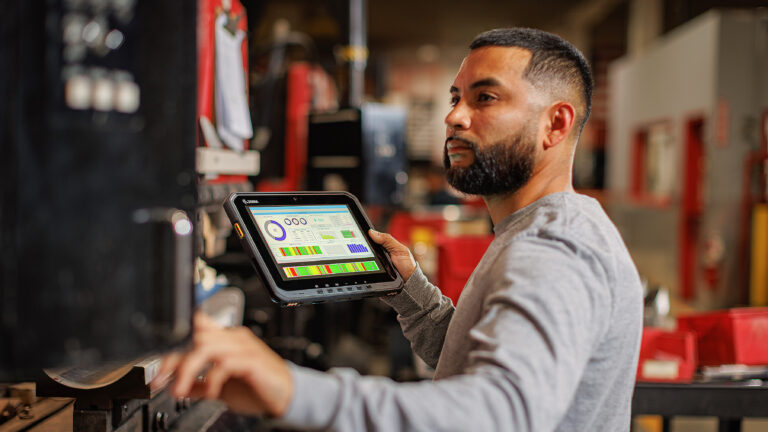In an increasingly mobile and digital world, industries across the spectrum are feeling the pressure to adapt and innovate. Particularly, the manufacturing sector is facing immense pressure to streamline operations and increase productivity. Now more than ever, the sector is exploring the myriad opportunities offered by advanced technologies like mobile applications.
Mobility and data analysis are now considered top priorities for manufacturing companies. A recent survey stated that almost 86% of CEOs believe that a clear vision of advanced technologies, including mobility, provides a competitive edge crucial to their investment’s success. CEOs, CTOs, CIOs, and other decision-makers are prioritizing mobile technologies to drive strategic revolution in the manufacturing industry. The pandemic and the fourth industrial revolution, Industry 4.0, are fueling this rapid technology adoption.
The Rise of Mobility in Manufacturing
Mobile technology was once considered a luxury in manufacturing; today, it’s a necessity. Manufacturing managers are increasingly utilizing mobile devices like tablets and smartphones to access real-time information, leading to quicker, more informed decision-making. This shift towards mobility is impacting every facet of the industry, from communication and quality control to safety and customer satisfaction.
Mobile Technology Benefits
Let’s examine six significant benefits that mobile technology brings to the manufacturing sector:
- Simplified Operations: The intricacies of today’s manufacturing operations often require technological solutions. Mobile devices provide a comprehensive overview of the entire operation, leading to informed decision-making and potential automation of the manufacturing process. This simplification frees up time and resources for other essential activities, such as innovation and marketing.
- Quality and Inventory Management: Mobile technology enables real-time tracking of equipment performance and workforce productivity. It facilitates better decision-making regarding resource allocation and quality control processes, while also managing inventory levels and tracking order status.
- Safety Compliance: Mobile devices allow managers to oversee the manufacturing process and identify potential safety hazards. They ensure employees adhere to correct safety protocols, thereby fostering a safer workplace.
- Supply Chain Coordination: Mobile solutions automate coordination within the supply chain. They enable manufacturing companies to track customer orders and inventory status, while also facilitating coordination with suppliers and customers.
- Predictive Analytics: Mobile apps are increasingly incorporating predictive analytics, allowing for efficient cost analysis and problem prediction. These solutions help manufacturers detect equipment failure, downtime, and other production issues early on.
- Improved Resource Management: Mobile applications powered by Artificial Intelligence (AI) can provide valuable insights into factory equipment and processes, aiding better decision-making.
Mobile Technology Driving Efficiency and Productivity
The ERP application is an area where automation and mobility have been particularly beneficial. Managing the supply chain has become one of the biggest challenges for manufacturing organizations. The use of ERP applications can streamline the distributor and customer network on a single, interlinked platform. These platforms reduce errors, bolster tracking and tracing segments, reduce manual work, and improve productivity.
Inventory management is another area where mobile technology has proven useful. Given the variety of products and materials in any manufacturing company, managing inventory is a complex task. Mobile technology allows for efficient stock management by tracking, managing, and storing all production material more efficiently.
Manufacturers have also started leveraging mobile technology to optimize workflows. Technological tools and applications help improve employee productivity, thereby driving higher revenue growth. Mobile technology ensures real-time updates for customers regarding order status, expected delivery dates, and other essential information. Such real-time updates are critical to production processes as they prevent revenue loss and facilitate better decision-making.
The Role of StrataFlows
Given the multitude of benefits, it is no surprise that CIOs rank investment in mobile technologies as a top business priority, according to a Gartner study. Adopting mobile technologies helps manufacturers enhance their global capabilities, simplify crucial business processes, and increase employee productivity levels.
This is where StrataFlows can step in with its mobile application. StrataFlows provides a holistic mobile solution specifically designed for the manufacturing sector. It facilitates real-time monitoring of day-to-day operations, aiding in mobilizing and optimizing supply chain operations. It increases overall productivity by providing access to critical information and facilitating collaboration across different levels of the organization.
In the highly volatile and dynamic markets of today, StrataFlows helps reduce data gaps and increase customer responsiveness. It provides valuable insights about stock storage, shipments, and customer complaints, helping companies achieve a higher level of accuracy in their manufacturing operations.
In conclusion, the transformation of the manufacturing industry through mobile technologies like StrataFlows has resulted in more significant standardization of strategies and procedures, thereby expanding the competitive capabilities of manufacturers. By converting conventional manual processes into automated systems, unnecessary costs are reduced, and productivity is increased, reinforcing the role of mobility in the future of manufacturing.
If you would like to learn more, Visit StrataFlows website or Schedule a Brief Web Call with one of our product specialists.





